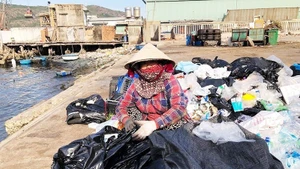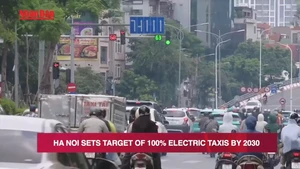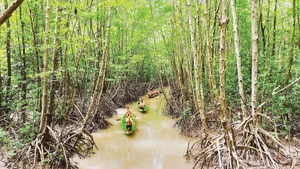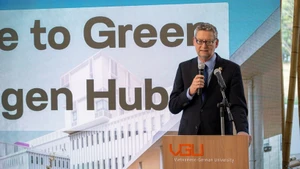On July 12, 2025, the Prime Minister issued Directive No. 20/CT-TTg on several urgent and resolute measures to prevent and address environmental pollution – reflecting the strong determination of the Party and State on this matter.
Throughout the process of national construction and development, particularly during the renewal period, environmental protection has always been a top priority for the Party and State. The Party has identified environmental protection, alongside socio-economic development, as an essential and inseparable pillar that determines the nation’s sustainable development.
On this basis, the Party’s guidelines, the State’s policies and laws, and the Government’s directives on environmental protection have been promulgated, creating a favourable legal framework for environmental protection efforts.
Notable examples include: Directive No. 36-CT/TW dated June 25, 1998 of the Politburo on strengthening environmental protection in the period of industrialisation and modernisation; Resolution No. 41-NQ/TW of the Politburo dated November 15, 2004 on environmental protection in the period of accelerating industrialisation and modernisation; Resolution No. 24-NQ/TW dated June 3, 2013 of the Party Central Committee on proactive climate change response, enhanced resource management and environmental protection; the Law on Environmental Protection; and the National Green Growth Strategy for the 2021-2030 period, with a vision to 2050 (issued together with Decision No. 1658/QD-TTg of the Prime Minister dated October 1, 2021).
In its 13th National Congress Resolution, the Party clearly set out its viewpoint: to place the protection of the living environment and people’s health as the foremost objective; to resolutely eliminate projects causing environmental pollution; to ensure environmental quality, protect biodiversity and ecosystems; and to build a green, circular, and environmentally friendly economy.
However, environmental pollution continues to develop in a complex manner, with severe pollution persisting in certain areas, especially air pollution in major cities and water pollution in densely populated areas, production facilities, businesses, service establishments, and craft villages.
The issuance of Directive No. 20 demonstrates Viet Nam’s strong determination to prevent and address environmental pollution and serves as evidence of the Party and State’s profound concern for the lives of the people and the future generations.
A notable feature of the Directive is its requirement for ministries, sectors and localities to “act immediately, resolve immediately” on environmental hotspots, with specific accountability assigned to leaders. Beyond general objectives, the Directive sets out concrete requirements on waste management, emissions control, wastewater treatment, application of advanced treatment technologies, and promotion of the circular economy.
Directive No. 20 defines environmental protection as not only the responsibility of management agencies but of the entire population. It encourages active participation from communities, businesses and social organisations, and underscores the role of public oversight in detecting and reporting violations.
Expanding participation is crucial, as environmental protection can only succeed when it becomes a broad-based social movement.
Moreover, Directive No. 20 calls for enhanced application of digital technology in environmental monitoring, such as online monitoring systems and open access to data for public use. This is a breakthrough measure, creating transparency and enabling public opinion to monitor and accompany functional agencies.
According to the 2024 report of the Ministry of Natural Resources and Environment (now the Ministry of Agriculture and Environment), over 60% of Viet Nam’s major rivers suffer from varying levels of pollution, while the air quality in major cities like Ha Noi and Ho Chi Minh City remains persistently poor.
Specifically, the AQI in Ho Chi Minh City during the early months of 2025 ranged from 150 to 200, a hazardous level for public health. In Ha Noi, several episodes of severe pollution have been recorded, notably on January 7, 2025, when Ha Noi ranked first globally for air pollution, surpassing Delhi (India) and Karachi (Pakistan).
Failure to act promptly will result in decreasing public health, increased disease prevalence, rising healthcare costs and economic losses. The World Bank (WB) estimates that economic losses due to air pollution in Viet Nam amount to 5% of GDP annually. This alarming figure highlights the urgent need for decisive action to protect the environment.
Immediately after its promulgation, Directive No. 20 received much agreement and support. However, there were also some concerns, such as opinions suggesting that the measures in the Directive lack feasibility, are not suitable to practical conditions, require substantial resources, or could negatively affect low-income groups.
In reality, Directive No. 20 clearly stipulates the protection of citizens’ rights, especially those of vulnerable groups, by requiring localities to develop appropriate roadmaps, support people and businesses in adopting clean technologies, and ensure no one is left behind.
During implementation, emerging issues are addressed by competent authorities, who listen and seek solutions for the common good of the community.
Globally, many countries have adopted robust measures against pollution. Europe has over 320 Low Emission Zones (LEZs) in operation, expected to reach 507 by 2025. The UK has implemented a Zero Emission Zone (ZEZ) in Oxford. France uses the “crit’air” sticker system to restrict older, more polluting vehicles from entering city centres.
These policies initially faced public opposition but have since proven effective, contributing to improving air quality and enhancing public health.
The common thread between these policies and Directive No. 20 is their focus on long-term social benefits, despite potential short-term difficulties for certain groups. For Directive No. 20 to be effective, a wide range of solutions must be implemented in a coordinated manner.
First, public awareness must be raised. Communication efforts should be innovative, leveraging modern media channels and social networks to reach young people. Campaigns such as “Green Sunday”, “Say No to Plastic Bags”, and “Let’s Clean the Sea” should be held regularly to spread a sense of responsibility.
Secondly, greater involvement of experts, scientists, and social organisations is needed in policy monitoring and feedback. Only when citizens are fully informed and heard, social consensus can be truly sustainable.
Thirdly, the legal framework must be improved and sanctions strengthened. Illegal discharges must be strictly punished, with no “exempt zones”.
Fourthly, international cooperation must be enhanced, enabling Viet Nam to learn from other countries’ environmental management experience and to access technical and financial support for effective implementation of Directive No. 20.
Directive No. 20 is a timely, decisive and comprehensive step, meeting the pressing demands of reality. It not only addresses current pollution but also set out a roadmap for sustainable development, laying the foundation for a green and circular economy in the future.
The implementation of Directive No. 20 will make a practical contribution to protecting the living environment and the health of the people, for the sustainable future of the nation. At the same time, it affirms Viet Nam’s credibility and position in the international arena as a country that acts responsibly towards the international community.
















